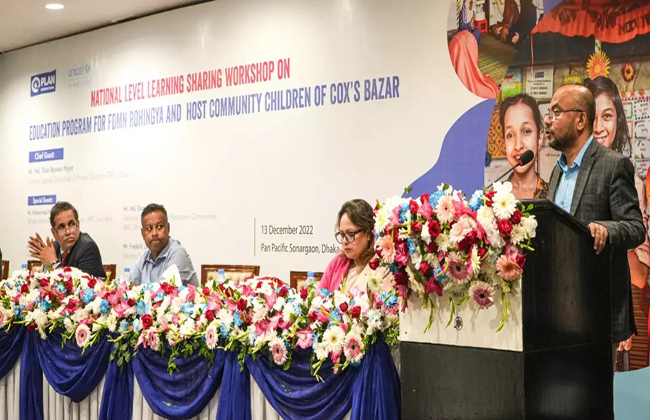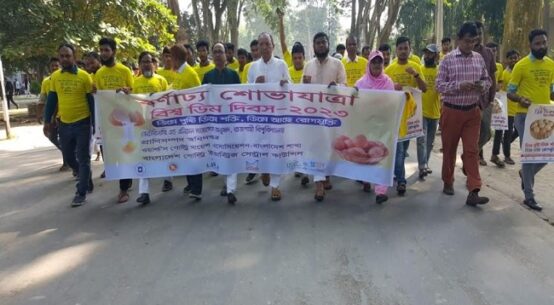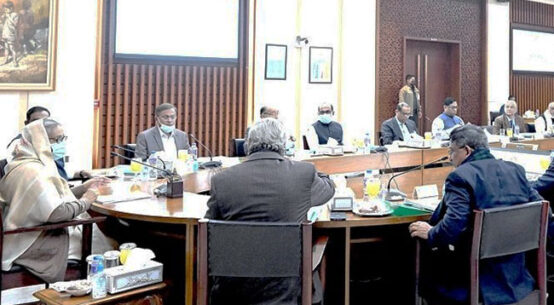
Development of children from Rohingya and host communities is facing several challenges and integrated efforts and mechanism are required to ensure their holistic development, so that they can grow up becoming skilled individuals, said experts during a learning sharing workshop.The workshop was organized recently by the international development organisation Plan International Bangladesh under the “Providing Early Childhood and Basic Education for Rohingya and Host Community Children”, project, with the support of UNICEF.
Addressing the event as the Chief Guest, Syed Mamunul Alam, Director General of the Directorate of Primary Education (DPE), said, to ensure repatriation of the Rohingya community, language skill development can be an instrumental mechanism. Mohammed Mizanur Rahman, Refugee, Relief, and Repatriation Commissioner, RRRC, Cox’s Bazar said, Education plays key role to improve the lives of Rohingya people living in the camps.
Bangladesh Government is prioritizing their education through its works and agenda, he said adding developing skilled Rohingya woman as teachers can be a crucial intervention. For the first time ever, with the support of UNICEF, Plan International Bangladesh has implemented integrated Early Childhood Development (i-ECD) centre (Shishu Bikash Kendra) at Rohingya camps and host communities.
To ensure joyful environment for children under five years old and to prepare them for the primary schooling, the organization is running 60 i-SBK centres in the camps and host communities (Camp 1 East, Camp 1 West, 3, 6, and 7, and Host community in Rajapalong union). Sixty facilitators both from Rohingya and host community educated youth group are facilitating these centres. For the first time in Bangladesh, these centres are ensuring children’s education, health, nutrition, protection and WASH.
A total of 1440 children are receiving the support from three to five years old age group. According to the data collected from August 2022-November 2022, children’s nutrition condition has developed through these centres. Monthly screening shows, no children from these i-SBK centres showcase any sign of malnutrition, while 1427 are in green zone, and only 13 showed mild symptom of malnutrition.
To identify the best practices and challenges, two survey was conducted; one at the beginning of 2022 and the other at the end of the year.The endline survey revealed that, through the i-SBK interventon, about 99 percent of children from 3-5 years old age level are now eager to go to school. Almost 83 percent Rohingya parents are aware of the support required for their children’s holistic development which was only 17 percent at the begining of the year. In the host community, this percentage rose from 58% to 85%.
Literacy skill has developed among 35.51 percent children of 6-14 years old, which was only 11 percent. Currently 99.27 percent. Also, the endline survey revealed the challenges of Rohingya and host community girls to access education. It showed, only 7.5 percent parents believe girls can contribute in the community while 22.64 percent parents feel their daughters will become confident through education. In the workshop, speakers emphasised on the need of training Rohingya woman as teachers. Plan International Bangladesh, with the support of UNICEF has trained and developed a pool of 97 Rohingya women who can get prioritised for teaching job in future.
During the workshop, Md Shamsud Douza, Additional Refugee, Relief and Repatriation Commissioner of RRRC office in Cox’s Bazar, Md. Nashim Ahamed, Additional Deputy Commissioner (ADC-HRM) of Cox’s Bazar, Mr. Frederik Leenknecht, Education Specialist of UNICEF spoke among others. Ashish Kumar Bakshi, Head of Cox’s Bazar and CHT Programme of Plan International Bangladesh gave welcome remarks.


